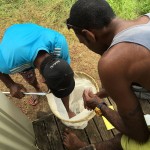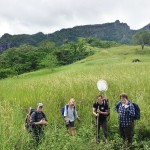The trip to Fiji was definitely a learning experience! Whilst I was there I was collecting my data for my honours project, and this would now be the second time I have done my own project. I thought that this time around, I would have all the ‘problems’ sorted before I began my data collection. I thought that all of my methodology would be figured out and fool-proof. But when I arrived to Fiji, it was raining and there were no bees flying about! Because of this, I had to completely do a 360 and re-do my methods.
This trip taught me to adapt and be flexible to changing situations. I had to accept that my methods (which I’d spent countless hours, days, and weeks developing) were not going to allow me to collect the data that I needed as the abundance of bees was very low compared to previous trips (for a reason we do not know). So we spent 3 days doing trial-runs of different ideas until we eventually came to our final method. I went from doing 5x2m quadrats, to 100m transects; something that was now going to create more complication in terms of the statistics later on, but also allow me to cover a larger area and increase my chances of getting good data.
Aside from changing methods, we also had to be very flexible with the weather. It was the end of the cyclone season, but the cyclones were still developing every few days and threatening the Fiji islands every so often. We got a lot of rain at the first site we went to (Nadarivatu, a highlands site) and this meant that for most of the time there, I did not get much data at all. Instead of being a complete waste of time; we managed to use the rainy time for collecting and building a pollen library (something you can do regardless of the weather) which was needed as part of my project. Because of the weather, I had to be flexible in my sampling schedule and just make do with the good weather that I was given, whenever it may have been, and use the bad weather time wisely (either catching up on data entry, or creating the pollen library).
By learning to be adaptable and flexible to situations, this is something that I will be able to use in not only future research endeavours, but also in many different areas of my life. Not everything goes to plan, something will always come up; and if something does – you shouldn’t let that affect your ability to do your absolute best in getting the best information that you can (ie. collecting the best data). You never know – you might just find something totally new for science, something you wouldn’t have found if your methods went to plan in the first place! Everything happens for a reason!
I saw some amazing places in the highlands of Fiji and met some great people. Fijians are definitely the most happiest and curious people I’ve ever met! Being able to teach the locals about their native bees, and see their interest and curiosity in learning about these things that they have probably never really thought about – really is such a rewarding experience. Planting little seeds of ‘environmental wisdom’ into their heads – which will hopefully develop over time and encourage conservation and appreciation of their surrounding habitats and regions.
I hope to see them all again soon!
Sarah Hayes, a Bachelor of Science (Honours) student, is participating in Biodiversity and Ecosystem Health Across the Pacific in Fiji in 2016
- Read Sarah’s pre-departure blog here
- Read more stories through the New Colombo Plan here
- Check the New Colombo Plan funded opportunities here



